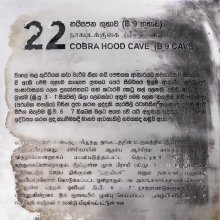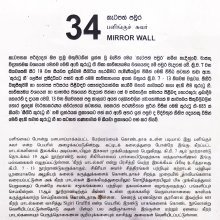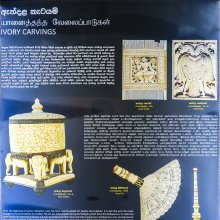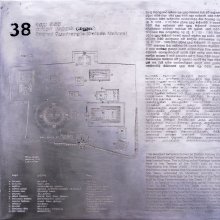Nica, Nīca, Nicā: 25 definitions
Introduction:
Nica means something in Hinduism, Sanskrit, Buddhism, Pali, the history of ancient India, Marathi, Hindi, Tamil. If you want to know the exact meaning, history, etymology or English translation of this term then check out the descriptions on this page. Add your comment or reference to a book if you want to contribute to this summary article.
Alternative spellings of this word include Nicha.
Images (photo gallery)
In Hinduism
Natyashastra (theatrics and dramaturgy)
Source: Wisdom Library: Nāṭya-śāstraNīca (नीच, “low”) refers to one of six “ornaments”, or ‘figures of speech’ (alaṃkāra). According to the Nāṭyaśāstra chapter 19, these six ornaments are part of the ‘vocal representation’ (vācika), which is used in communicating the meaning of the drama and calling forth the sentiment (rasa). The term is used throughout nāṭyaśāstra literature.
These ornaments dictate the type of recitation, eg. nīca and druta should be used in the Terrible and the Odious sentiment.
Source: archive.org: Natya ShastraNīca (नीच, “low”).—One of the six alaṃkāras;—(Uses:) The low note proceeds from the chest register, but has a very low pitch (mandra-tara) sound; it is to be used in natural speaking, sickness, weariness due to austerities and walking a distance, panic, falling down, fainting and the like.

Natyashastra (नाट्यशास्त्र, nāṭyaśāstra) refers to both the ancient Indian tradition (shastra) of performing arts, (natya—theatrics, drama, dance, music), as well as the name of a Sanskrit work dealing with these subjects. It also teaches the rules for composing Dramatic plays (nataka), construction and performance of Theater, and Poetic works (kavya).
Vyakarana (Sanskrit grammar)
Source: Wikisource: A dictionary of Sanskrit grammarNīca (नीच).—A term used for the grave accent or for the vowel, accented grave; cf. स्वरितयोर्मध्ये यत्र नीचं स्यात् (svaritayormadhye yatra nīcaṃ syāt) T. Pr. XIX. 1. उन्नीचे मे नीचमुच्चात् (unnīce me nīcamuccāt) R. T. 54, 55 cf. also V. Pr. I. 111.

Vyakarana (व्याकरण, vyākaraṇa) refers to Sanskrit grammar and represents one of the six additional sciences (vedanga) to be studied along with the Vedas. Vyakarana concerns itself with the rules of Sanskrit grammar and linguistic analysis in order to establish the correct context of words and sentences.
Jyotisha (astronomy and astrology)
Source: Wisdom Library: Brihat Samhita by Varahamihira1) Nīca (नीच) refers to the Cāṇḍālas (Chandalas), according to the Bṛhatsaṃhitā (chapter 5), an encyclopedic Sanskrit work written by Varāhamihira mainly focusing on the science of ancient Indian astronomy astronomy (Jyotiṣa).—Accordingly, “If the sun and moon should begin to be eclipsed when only half risen, deceitful men will suffer as well as sacrificial rites. [...] If they should be eclipsed when in the sign of Sagittarius (Dhanuṣa), ministers, fine horses, the Videhas, the Mallānas, the Pāñcālas, physicians, merchants and persons skilled in the use of destructive weapons will perish. If when in the sign of Capricornus (Makara), fishes, the families of ministers, the Cāṇḍālas [i.e., nīca], skilled magicians, physicians and old soldiers will perish”.
2) Nīca (नीच) refers to “(one who is) mean”, according to the Bṛhatsaṃhitā (chapter 15) (“On the nakṣatras—‘asterisms’”).—Accordingly, “Those who are born on the lunar day of Pūrvabhādrapada will be thieves, shepherds, torturers; wicked, mean (nīca) and deceitful; will possess no virtues; neglect religious rites and will be successful in fight. [...]”.
Source: Wikibooks (hi): Sanskrit Technical TermsNīca (नीच).—Perigee of epicycle or the eccentric of the planet. Note: Nīca is a Sanskrit technical term used in ancient Indian sciences such as Astronomy, Mathematics and Geometry.

Jyotisha (ज्योतिष, jyotiṣa or jyotish) refers to ‘astronomy’ or “Vedic astrology” and represents the fifth of the six Vedangas (additional sciences to be studied along with the Vedas). Jyotisha concerns itself with the study and prediction of the movements of celestial bodies, in order to calculate the auspicious time for rituals and ceremonies.
Purana and Itihasa (epic history)
Source: archive.org: Shiva Purana - English TranslationNīca (नीच) refers to the “base-born” (persons), according to the Śivapurāṇa 2.2.23. Accordingly as Śiva said to Satī:—“[...] O Goddess Satī, listen, I shall explain the great principle whereby the remorseful creature becomes a liberated soul (mukta). [...] Attracted by devotion and as a result of its influence, O Goddess, I go even to the houses of the base-born (nīca) and outcastes. There is no doubt about it”.

The Purana (पुराण, purāṇas) refers to Sanskrit literature preserving ancient India’s vast cultural history, including historical legends, religious ceremonies, various arts and sciences. The eighteen mahapuranas total over 400,000 shlokas (metrical couplets) and date to at least several centuries BCE.
Shaktism (Shakta philosophy)
Source: Wisdom Library: ŚāktismNīca (नीच, “lower”) refers to one of the sixty defects of mantras, according to the 11th century Kulārṇava-tantra: an important scripture of the Kaula school of Śāktism traditionally stated to have consisted of 125.000 Sanskrit verses.—Accordingly, as Īśvara says to Śrī Devī: “For those who do japa without knowing these defects [e.g., nīca—lower], there is no realization even with millions and billions of japa. [...] Oh My Beloved! there are ten processes for eradicating defects in Mantras as described. [...]”.

Shakta (शाक्त, śākta) or Shaktism (śāktism) represents a tradition of Hinduism where the Goddess (Devi) is revered and worshipped. Shakta literature includes a range of scriptures, including various Agamas and Tantras, although its roots may be traced back to the Vedas.
Sports, Arts and Entertainment (wordly enjoyments)
Source: archive.org: Syainika Sastra of Rudradeva with English Translation (art)1) Nīca (नीच) refers to “low people”, according to the Śyainika-śāstra: a Sanskrit treatise dealing with the divisions and benefits of Hunting and Hawking, written by Rājā Rudradeva (or Candradeva) in possibly the 13th century.—Accordingly, [while discussing the training of hawks]: “In calling the hawk, either its wings should be tied or it should be covered with cloth. When it comes it should be rewarded by food, so that it may not be disappointed. [...] If highly fed, they grow naughty; if starved, they do not grow attached or strong. Birds of this clas are like low people (nīca) [nīcastathaivaiṣa gaṇaḥ smṛtaḥ]. [...]”.
2) Nīca (नीच) refers to the “downwards attack” (of the Vāja Hawks), according to the Śyainika-śāstra.—Accordingly, [while discussing the outlines of hawking]: “[...] Attacks are of three kinds, upwards, horizontal and downwards (nīca-ākrānti). All three attacks are very enjoyable when the Vājas attack the Varajas. [...] When, through fear, the quarry is flying below, falling down upon it like the thunderbolt, suddenly from above, is called the downward attack (nīca-ākrānti). It is a hard feat”.

This section covers the skills and profiencies of the Kalas (“performing arts”) and Shastras (“sciences”) involving ancient Indian traditions of sports, games, arts, entertainment, love-making and other means of wordly enjoyments. Traditionally these topics were dealt with in Sanskrit treatises explaing the philosophy and the justification of enjoying the pleasures of the senses.
India history and geography
Source: Cologne Digital Sanskrit Dictionaries: Indian Epigraphical GlossaryNīca.—(CII 1), mean or low. (CII 1), southern. Note: nīca is defined in the “Indian epigraphical glossary” as it can be found on ancient inscriptions commonly written in Sanskrit, Prakrit or Dravidian languages.

The history of India traces the identification of countries, villages, towns and other regions of India, as well as mythology, zoology, royal dynasties, rulers, tribes, local festivities and traditions and regional languages. Ancient India enjoyed religious freedom and encourages the path of Dharma, a concept common to Buddhism, Hinduism, and Jainism.
Languages of India and abroad
Pali-English dictionary
Source: BuddhaSasana: Concise Pali-English Dictionarynīca : (adj.) low; humble; inferior.
Source: Sutta: The Pali Text Society's Pali-English DictionaryNīca, (adj.) (Vedic nīca, adj. -formation fr. adv. ni°, cp. Sk. nyañc downward) low, inferior, humble (opp. ucca high, fr. adv. ud°) Vin. I, 46, 47; II, 194; D. I, 109, 179, 194; A. V, 82; SnA 424 (nīcaṃ karoti to degrade); & passim.

Pali is the language of the Tipiṭaka, which is the sacred canon of Theravāda Buddhism and contains much of the Buddha’s speech. Closeley related to Sanskrit, both languages are used interchangeably between religions.
Marathi-English dictionary
Source: DDSA: The Molesworth Marathi and English Dictionarynīca (नीच).—a (S) Low, not high or tall. 2 Low (in place, condition, quality, value, price). 3 Low, mean, base. 4 In music. Deep or bass. Note. In the above senses the word is Nits, in these following, Nitsh. 5 a S (therefore Nitsh.) See all the senses above. 6 n The perigee of a planet. 7 That sign of the Zodiac in which a planet has its least or feeblest influence; viz. Libra for the sun, Cancer for Mars &c.
--- OR ---
nīcā (नीचा).—a (nīca) Inferior, worse, lower in quality or price.
Source: DDSA: The Aryabhusan school dictionary, Marathi-Englishnīca (नीच).—a Low, not high or tall. Mean, base. In music. Deep or bass.
--- OR ---
nīcā (नीचा).—a (nīca) Inferior, worse, lower in quality or price.
Marathi is an Indo-European language having over 70 million native speakers people in (predominantly) Maharashtra India. Marathi, like many other Indo-Aryan languages, evolved from early forms of Prakrit, which itself is a subset of Sanskrit, one of the most ancient languages of the world.
Sanskrit dictionary
Source: DDSA: The practical Sanskrit-English dictionaryNīca (नीच).—a. [nikṛṣṭatamīṃ śobhāṃ cinoti, ci-ḍa Tv.]
1) Low, short, small, little, dwarfish.
2) Situated below, being in a low position; नात्युच्छ्रितं नातिनीचं चैलाजिनकुशोत्तरम् (nātyucchritaṃ nātinīcaṃ cailājinakuśottaram) Bhagavadgītā (Bombay) 6.11; Manusmṛti 2.198; Y.1.131.
3) Lowered, deep (as a voice).
4) Low, mean, base, vile, worst; प्रारभ्यते न खलु विघ्नभयेन नीचैः (prārabhyate na khalu vighnabhayena nīcaiḥ) Bhartṛhari 2.27; नीचस्य गोचरगतैः सुखमास्यते कैः (nīcasya gocaragataiḥ sukhamāsyate kaiḥ) 59; Bv.1.48.
5) Worthless, insignificant. चः (caḥ) A kind of perfume (coraka).
-cā An excellent cow.
-cam The lowest point of a planet.
--- OR ---
Nīcā (नीचा).—ind. Ved. Low, downward.
Source: Cologne Digital Sanskrit Dictionaries: Shabda-Sagara Sanskrit-English DictionaryNīca (नीच).—mfn.
(-caḥ-cā-caṃ) 1. Low (in stature) short, dwarfish. 2. Low, (in condition) vile, base, mean. 3. Deep. E. na privative, ī good fortune, ci to obtain, aff. ḍa.
Source: Cologne Digital Sanskrit Dictionaries: Benfey Sanskrit-English DictionaryNīca (नीच).—i. e. ni-añc + a, adj., f. cā. 1. Low, [Mānavadharmaśāstra] 2, 198. 2. Short, [Yājñavalkya, (ed. Stenzler.)] 1, 131. 3. Deep, [Pañcatantra] i. [distich] 225. 4. Base, mean, [Rāmāyaṇa] 3, 35, 35. 5. ºcais, instr. pl., adv. 1. Below, [Meghadūta, (ed. Gildemeister.)] 43. 2. Low-bowing, Mahābhārata 1, 3287. 3. Little, [Raghuvaṃśa, (ed. Stenzler.)] 3, 43. 4. Humbly, Kām. Nītis. 7, 42. 5. Softly, [Amaruśataka, (ed. Calcutt.)] 67.
Source: Cologne Digital Sanskrit Dictionaries: Cappeller Sanskrit-English DictionaryNīca (नीच).—[adjective] low, deep (lit. & [figuratively]), inferior, mean, base; [abstract] tā [feminine], tva [neuter]
--- OR ---
Nīcā (नीचा).—([instrumental] [adverb]) below, down.
Source: Cologne Digital Sanskrit Dictionaries: Monier-Williams Sanskrit-English Dictionary1) Nīca (नीच):—mf(ā)n. (ni +2. añc) low, not high, short, dwarfish, [Manu-smṛti; Mahābhārata] etc.
2) deep, depressed (navel), [Pañcatantra]
3) short (hair, nails), [Suśruta]
4) deep, lowered (voice), [Prātiśākhya]
5) low, vile, inferior (socially or morally), base, mean (as a man or action or thought), [Varāha-mihira; Mahābhārata; Kāvya literature] etc.
6) m. a kind of perfume (= coraka), [cf. Lexicographers, esp. such as amarasiṃha, halāyudha, hemacandra, etc.]
7) n. (in [astrology]) the lowest point of a planet (= ταπείνωμα), the 7th house from the culminating point, [Varāha-mihira] (cf. 2. ny-añc).
8) Nīcā (नीचा):—[from nīca] a ind. below, down, downwards, [Ṛg-veda; Atharva-veda]
9) [from ny-añc] b ind. (nīcā) See under nīca
Source: Cologne Digital Sanskrit Dictionaries: Yates Sanskrit-English DictionaryNīca (नीच):—[nī-ca] (caḥ-cā-caṃ) a. Low; vile; deep.
Source: DDSA: Paia-sadda-mahannavo; a comprehensive Prakrit Hindi dictionary (S)Nīca (नीच) in the Sanskrit language is related to the Prakrit words: Ṇia, Ṇīya.
[Sanskrit to German]
Sanskrit, also spelled संस्कृतम् (saṃskṛtam), is an ancient language of India commonly seen as the grandmother of the Indo-European language family (even English!). Closely allied with Prakrit and Pali, Sanskrit is more exhaustive in both grammar and terms and has the most extensive collection of literature in the world, greatly surpassing its sister-languages Greek and Latin.
Hindi dictionary
Source: DDSA: A practical Hindi-English dictionary1) Nīca (नीच) [Also spelled neech]:—(a) mean, base, vile; inferior; low, lowly; -[ūṃca] low or/and high, good or/and bad, proper or/and improper; —[kamāī] ill-earned money; immoral profession; —[kula] low family, low clan; •[kā] low-born; —[jāti] low caste; ~[pana/~panā] see [nīcatā].
2) Nīcā (नीचा) [Also spelled nicha]:—(a) mean, base, vile; low; deep; ~[ī] lowness; depth; ~[na] same as [nīcāī; —kāma] mean act; work undertaken by low castes, menial work; —[khānā] to suffer a defeat, to be put to humiliation; —[dikhānā] to humble to the dust, to beat one into fits; to insult/humiliate; to overpower, to inflict a defeat; [nīcī nigāha se dekhanā] to treat as low or inferior; to think as of no significance.
...
Kannada-English dictionary
Source: Alar: Kannada-English corpusNīca (ನೀಚ):—
1) [adjective] being, lying at a low or lower place, stratum.
2) [adjective] undersized; dwarf.
3) [adjective] (mus.) of, for or having the range of a bass.
4) [adjective] base; mean; contemptible.
5) [adjective] cruel; wicked.
6) [adjective] of little or no importance; unimportant; of no avail.
--- OR ---
Nīca (ನೀಚ):—
1) [noun] the quality of being dwarf; dwarfishness.
2) [noun] the quality of being base, mean; meanness; baseness.
3) [noun] he who slanders; a slanderer.
4) [noun] a mean, ignoble, small-minded fellow.
5) [noun] a wicked fellow; a villain.
6) [noun] a kind of perfume.
7) [noun] (astrol.) a house in the zodiac in which the astrological planets have bad influences inflicting distress, grief.
Kannada is a Dravidian language (as opposed to the Indo-European language family) mainly spoken in the southwestern region of India.
Tamil dictionary
Source: DDSA: University of Madras: Tamil LexiconNicā (நிசா) noun < niśā. Night; இரவு. (பிங்கலகண்டு) [iravu. (pingalagandu)]
Tamil is an ancient language of India from the Dravidian family spoken by roughly 250 million people mainly in southern India and Sri Lanka.
See also (Relevant definitions)
Starts with (+125): Nica-marnu, Nica-natya, Nica-panka-racayokam, Nicaa, Nicabhojya, Nicabuddhi, Nicacalam, Nicacaram, Nicacaran, Nicacittata, Nicada, Nicadaiva, Nicadha, Nicaga, Nicagamin, Nicagata, Nicagotra, Nicagriha, Nicai, Nicaih.
Ends with (+202): Acacia abyssinica, Acalypha neptunica, Aerva javanica, Aesculus californica, Albuca abyssinica, Alpinia japonica, Alpinia oceanica, American arnica, Ampelocissus abyssinica, Ampelopsis japonica, Anaxagorea javanica, Anemopsis californica, Anica, Aralia californica, Ardisia japonica, Aristolochia californica, Arnica, Artemisia abyssinica, Artemisia californica, Artemisia japonica.
Full-text (+159): Nicabhojya, Mahanica, Nicayonin, Nicagriha, Nisa, Nicoccavritta, Nicaga, Nicata, Nicavayas, Nicamedhra, Nicarksha, Anicadarshin, Nicavajra, Nicopagata, Nicaka, Anica, Niya, Nyanca, Nicarashi, Nicatma.
Relevant text
Search found 34 books and stories containing Nica, Ni-ca, Nī-ca, Nīca, Nīcā, Nicā, Nicha, Nisa, Nisaa; (plurals include: Nicas, cas, Nīcas, Nīcās, Nicās, Nichas, Nisas, Nisaas). You can also click to the full overview containing English textual excerpts. Below are direct links for the most relevant articles:
Rig Veda (translation and commentary) (by H. H. Wilson)
Tattvartha Sutra (with commentary) (by Vijay K. Jain)
Verse 6.25 - Influx of Karmas leading to low-status (nīca-gotra) < [Chapter 6 - Influx of Karmas]
Verse 6.26 - Influx of Karmas leading to low-status (ucca-gotra) < [Chapter 6 - Influx of Karmas]
Sahitya-kaumudi by Baladeva Vidyabhushana (by Gaurapada Dāsa)
Text 6.3 < [Chapter 6 - Third-rate Poetry and Super-excellent Poetry]
Laghu-yoga-vasistha (by K. Narayanasvami Aiyar)
Part 5 - The Story of Gādhi < [Chapter V - Upaṣānti-prakaraṇa]
Part 8 - The Story of a Siddha < [Chapter III - Utpatti-prakaraṇa]
Part 9 - The Conclusion of this Prakaraṇa < [Chapter III - Utpatti-prakaraṇa]
Annadatri-carita (study) (by Sarannya V.)
5. Vishkambha (brief description of story) < [Chapter 4 - Dramatic Appraisal of Annadatri-carita]
Shrimad Bhagavad-gita (by Narayana Gosvami)
Verses 6.11-12 < [Chapter 6 - Dhyāna-yoga (Yoga through the Path of Meditation)]
Related products
(+10 more products available)










